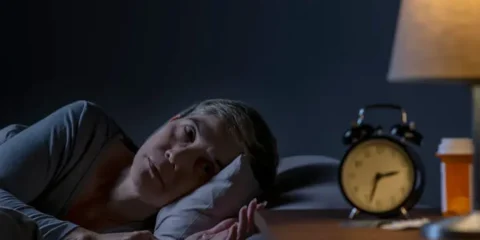Overwhelming Daytime Drowsiness
At Allure Medical, we recognize that sleep disorders like narcolepsy can significantly impact patients’ quality of life.
Our providers are experts in diagnosing and treating sleep conditions to help patients regain control of their health.
In this comprehensive guide, we’ll explore the symptoms, causes, diagnosis and treatments for narcolepsy to empower readers with a deeper understanding of this chronic neurological disorder.
What is Narcolepsy?
Narcolepsy is a chronic neurological disorder characterized by excessive daytime sleepiness (EDS), sudden attacks of muscle weakness, hallucinations and disruptions in normal sleep patterns. It affects an estimated 1 in 2,000 people in the US.
People with narcolepsy experience irresistible bouts of sleepiness throughout the day, even after getting adequate nighttime sleep. These “sleep attacks” involve immediately entering rapid eye movement (REM) sleep, which normally occurs later in the sleep cycle.
Cataplexy is another common symptom, causing sudden loss of muscle tone while a person is awake, often triggered by strong emotions like laughter, anger or surprise. This can result in slurred speech, weakness or collapse, though the person remains fully conscious.
At Allure Medical, our specialists understand that narcolepsy can severely impact a patient’s daily functioning and emotional health. By getting to the root cause with comprehensive testing and analysis, we create customized treatment plans to significantly improve sleep quality and restore restorative rest.
What Causes Narcolepsy?
Research shows that narcolepsy involves reduced levels of a neurotransmitter called hypocretin (also called orexin). Hypocretin regulates sleep/wake cycles in the brain and promotes wakefulness. Lower levels likely prevent the normal transitions between sleep stages.
Genetics play a strong role, with a 20-40x higher risk among close relatives. Specific gene mutations reduce hypocretin production or increase susceptibility to autoimmune disorders. Nearly all cases of narcolepsy with cataplexy involve a specific HLA gene variant.
Autoimmunity is another key factor, particularly in narcolepsy with cataplexy. The immune system may attack and destroy hypocretin-producing neurons in the brain, reducing hypocretin levels. Infections like influenza and strep throat can trigger this autoimmune reaction.
At Allure Medical, our integrative approach analyzes genetic predispositions, autoimmune factors and environmental triggers to identify personalized paths toward restorative sleep. Our providers partner with patients to optimize health holistically.
Signs and Symptoms of Narcolepsy
The symptoms of narcolepsy include:
- Excessive Daytime Sleepiness: Irresistible “sleep attacks” occur during the day, resulting in excessive sleepiness.
- Cataplexy: Sudden loss of muscle control while awake, often triggered by emotions.
- Sleep Paralysis: Being unable to move or speak while falling asleep/waking up.
- Hallucinations: Visual, auditory or sensory hallucinations when falling asleep/waking.
- Disrupted Nighttime Sleep: Frequent awakenings or difficulty staying asleep.
At Allure Medical, we recognize how profoundly disruptive EDS and cataplexy can be to patients’ daily functioning and emotional health. Our compassionate providers partner with each patient to thoroughly evaluate symptoms and customize an integrative treatment plan for their unique needs.
Narcolepsy Diagnosis and Testing
Since symptoms like EDS and cataplexy can indicate other underlying conditions, a clinical diagnosis of narcolepsy involves:
- Medical History: Thorough review of sleep patterns, symptoms, medication use and family history.
- Physical Exam: Checking for signs of underlying conditions like thyroid dysfunction.
- Sleep Study: Polysomnography (PSG) monitors brain waves, oxygen and breathing while sleeping.
- Multiple Sleep Latency Test (MSLT): Measures how quickly REM sleep begins while napping.
- Hypocretin Levels: Spinal tap to measure cerebrospinal fluid hypocretin levels.
At Allure Medical, our board-certified sleep medicine experts conduct comprehensive evaluations to accurately diagnose disorders like narcolepsy. We then develop customized treatment plans to target each patient’s unique symptoms and goals.
Treatments for Narcolepsy
While there is currently no cure for narcolepsy, various treatments can significantly improve symptoms like EDS and cataplexy. Our providers at Allure Medical tailor integrative treatment plans to each patient’s needs.
Lifestyle Changes: Optimizing sleep hygiene, regulating mealtimes, exercising, limiting caffeine and scheduling planned naps.
Medications: Stimulants like modafinil for EDS. Sodium oxybate for EDS and cataplexy. Antidepressants for cataplexy.
Talk Therapy: Cognitive behavioral therapy to develop healthy coping strategies.
NightLase®: Our breakthrough NightLase® therapy uses laser energy to reduce sleep apnea and loud snoring through collagen regeneration in oral tissues. This non-invasive treatment also improves sleep quality for narcolepsy patients.
At Allure Medical, we take an integrative approach that combines lifestyle strategies, advanced medical treatments and emerging innovations like NightLase®. Our passionate providers individualize care plans to help each patient reclaim restful sleep and thrive in daily life.
Coping with Narcolepsy: Creating a Supportive Environment
Living with narcolepsy poses unique emotional challenges. The constant sleep attacks and cataplexy can negatively impact self-esteem, productivity at work or school, and relationships.
As a renowned provider of medical and cosmetic services, Allure Medical is committed to removing the stigma around narcolepsy and other chronic conditions. We create welcoming, judgment-free environments where patients feel empowered on their treatment journey.
For families, friends and employers of those with narcolepsy, the most valuable support is simply understanding and empathy. Maintaining realistic expectations, allowing scheduled napping, and accommodating unpredictable sleep attacks/cataplexy episodes can make a major positive impact.
Our caring providers at Allure Medical provide counsel and resources on navigating family life, school, jobs and social situations with narcolepsy. We’re dedicated to helping patients not just manage symptoms, but truly thrive in all aspects of life.
The Takeaway – Seeking Effective Narcolepsy Treatment
Narcolepsy is a chronic neurological disorder that disrupts normal sleep-wake cycles, causing excessive daytime sleepiness, cataplexy, hallucinations and sleep paralysis. While there is currently no cure, integrative treatment plans can significantly improve symptoms and daily functioning.
If you or a loved one suffer from excessive, uncontrollable sleepiness or episodes of muscle weakness, don’t struggle alone. The experts at Allure Medical are here to listen, diagnose the root cause, and create a customized treatment plan just for you.
We combine advanced medical therapies with holistic lifestyle changes, emerging innovations like NightLase® and compassionate support.
At Allure Medical, your health, wellbeing and quality of life are our top priorities. Contact us today to take the first step toward restful nights and thriving days.
FAQ: Sleep Order Narcolepsy
Q: What is narcolepsy?
A: Narcolepsy is a chronic sleep disorder characterized by excessive, uncontrollable daytime sleepiness, cataplexy (sudden muscle weakness), sleep paralysis, and disrupted nighttime sleep.
Q: What causes narcolepsy?
A: Narcolepsy is caused by low levels of the brain chemical hypocretin, which regulates sleep/wake cycles. Autoimmune disorders, genetics, infections and brain injuries can reduce hypocretin.
Q: What are the symptoms of narcolepsy?
A: The main symptoms are excessive daytime sleepiness no matter how much you sleep at night, cataplexy (sudden loss of muscle tone triggered by emotions), hallucinations while falling asleep/waking up, and sleep paralysis.
Q: How is narcolepsy diagnosed?
A: Diagnosis involves a medical history, physical exam, overnight sleep study, daytime nap study to measure sleep latency, and sometimes a spinal tap to measure hypocretin levels.
Q: What is the treatment for narcolepsy?
A: Treatments can include medications like stimulants and sodium oxybate, lifestyle changes, talk therapy, scheduled naps, and emerging therapies like NightLase.
Q: Is there a cure for narcolepsy?
A: There is currently no cure for narcolepsy, but symptoms like excessive daytime sleepiness and cataplexy can be managed through a combination of medications, lifestyle changes, therapy and support.
Q: What is cataplexy?
A: Cataplexy is sudden muscle weakness or paralysis while awake, usually triggered by strong emotions. It is a common symptom of narcolepsy.
Q: What causes cataplexy?
A: Cataplexy is caused by low hypocretin levels in the brain, which regulates muscle tone. Autoimmune destruction of hypocretin neurons or lack of hypocretin production can cause cataplexy.
Q: How is cataplexy treated?
A: Cataplexy can be treated with medications like antidepressants, sodium oxybate, and stimulants. Lifestyle changes and emotional control techniques may also help reduce episodes.
Q: What is excessive daytime sleepiness (EDS)?
A: EDS is characterized by persistent sleepiness throughout the day and tendency to fall asleep unintentionally, even with adequate nighttime sleep. It’s a key symptom of narcolepsy.
Q: What causes EDS in narcolepsy?
A: EDS is caused by narcolepsy patients quickly entering REM sleep during the day, which leads to poor quality sleep and inability to stay awake.
Q: How can you treat EDS from narcolepsy?
A: EDS can be treated with stimulant medications, scheduled naps, improved sleep habits, limiting caffeine, and emerging therapies like NightLase.
Q: What are signs of narcolepsy in children?
A: Signs in children can include excessive sleepiness, cataplexy triggered by laughter/excitement, waking up frequently at night, and sleep paralysis.
Q: Can narcolepsy be cured naturally?
A: There is no natural cure for narcolepsy. However, improving sleep habits, diet, exercise, and stress management along with medical treatment can help manage symptoms.
Q: Is narcolepsy a disability?
A: Yes, narcolepsy is considered a disability under the Americans with Disabilities Act (ADA). People with narcolepsy can request reasonable accommodations at work and school.










